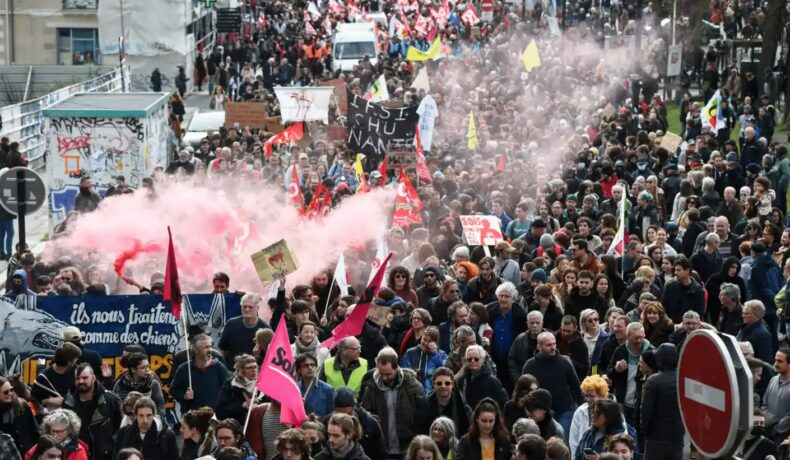In a nutshell
- The French government is expected to face a no-confidence vote on Monday following its efforts to raise the state pension age.
- Prime Minister Elisabeth Borne invoked article 49.3 to avoid a parliamentary vote which triggered the motions.
- The protests continue in France and hundreds are detained by the police.

The French government will face a no-confidence vote on Monday subsequent to its efforts to increase the pension age. The two no-confidence resolutions were filed by the opposition parties to counter President Emmanuel Macron’s use of contentious executive powers to increase the state pension age from 62 to 64.
French Prime Minister Elisabeth Borne had recently invoked Article 49.3 of the French Constitution, which empowers the government to push through the legislation without a parliamentary vote, amidst shouts and chants from left-wing lawmakers waving placards protesting the unpopular reform.
No-confidence votes unlikely to pass
The no-confidence votes, though they stress the growing disapproval of the government’s measures, are considered unlikely to pass since they would necessitate an unprecedented coalition of all the warring opposition parties.
To satisfy the high barrier of an absolute majority of 287 votes, there would have to be a unified front throughout the political spectrum, from the extreme left to Marine Le Pen’s far-right and Nicolas Sarkozy’s right wing, Les Républicains.
Out of the two motions, one was filed by the centrist group Liot as a type of multiparty no-confidence motion, and it was co-signed by the Nupes coalition of left-wing parties. Le Pen’s far-right National Rally party, which has 88 MPs, has submitted another no-confidence resolution.
A no-confidence vote could only pass with the backing of a substantial percentage of Les Républicains MPs. But the party’s head, Éric Ciotti, has instructed his MPs not to vote against the administration, citing the risk of “chaos.”
The political office of Eric Ciotti, head of Les Republicains, in the southern city of Nice, was vandalized overnight, and tags were left warning violence if the motion was not supported.
Meanwhile, Ciotti stated on Twitter that he will never yield to the ‘’disciples of terror’’.
Ongoing Protests
France has been witnessing demonstrations and protests over the last few months prompted by the pension changes. Over 160 protesters were detained across France in the early hours of Sunday morning, following the third night of street protests since the government forced through the pension amendments.
An estimated 4,000 protesters gathered in the Place de la Concorde on Saturday to burn an effigy of Macron. Protests have been held in towns such as Bordeaux, Brest, and other areas of Paris after unions called for a determined demonstration of opposition ahead of the country’s ninth day of nationwide industrial action on Thursday.
Numerous French towns, including Marseille, Montpellier, and Nantes, saw peaceful protests as well as occasional cases of violence.
Massive protests also took place in cities such as Compiegne in the north, Nantes in the west, and Marseille in the south. Riot police sprayed tear gas and battled with protestors while garbage bins were set on fire.
In the face of continuous protests, France’s interior minister, Gerald Darmanin, offered the police “additional protection measures” earlier on Thursday.
Further nationwide protests have been announced by French labor organizations on March 23.












